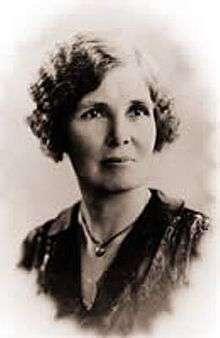Dorothea Bleek

Dorothea Frances Bleek aka Dorothy F. Bleek (26 March 1873 Mowbray, Cape - 27 June 1948 Newlands, Cape) [1] was an anthropologist and philologist known for her research on the San Bushmen of southern Africa. She was born into her profession as the fifth daughter of Wilhelm Bleek, a pioneering philologist studying the languages and cultures of southern Africa in the late 1800s. Much of his work was done in partnership with his sister-in-law (Dorothy Bleek's aunt) Lucy Lloyd. The work of Dorothy Bleek was largely a continuation of her father and aunt's research, but she also made numerous notable contributions of her own to the field. Her culminating work, published after death, was the book A Bushman Dictionary, still referenced today.[2]
Bleek's research and findings are often overshadowed by the work of her father, and she has been criticised for lacking the empathy and intuition of him and her aunt. This has led to a perception of her as a racist.[3] Despite this, Bleek's research on the language, customs, and especially rock art of the African native populations in present-day South Africa, Tanzania, Botswana, and Namibia stands as a vital contribution to scholarship on the region. Her photographs and audio recordings were especially important to later researchers.[4]
Bibliography
- Dorothea Bleek, Bushman Dictionary at Google Books. ISBN 9785882327261
Notes
- ↑ Standard Encyclopaedia of Southern Africa vol.2
- ↑ "African Rock Art Digital Archive"
- ↑ Dr. Jill Weintroub, "Developing a Feeling for Fieldwork: Dorothea Bleek's Southern Africa research 1905-1930", 23 August 2011.
- ↑ Andrew Bank, "Anthropology and Fieldwork Photography: Dorothea Bleek's Expedition to the Northern Cape and the Kalahari, July to December, 1911."
External links
- The San (Bushman) Photographs of Dorothea Bleek, University of Cape Town Libraries
- The Digital Bleek and Lloyd
|